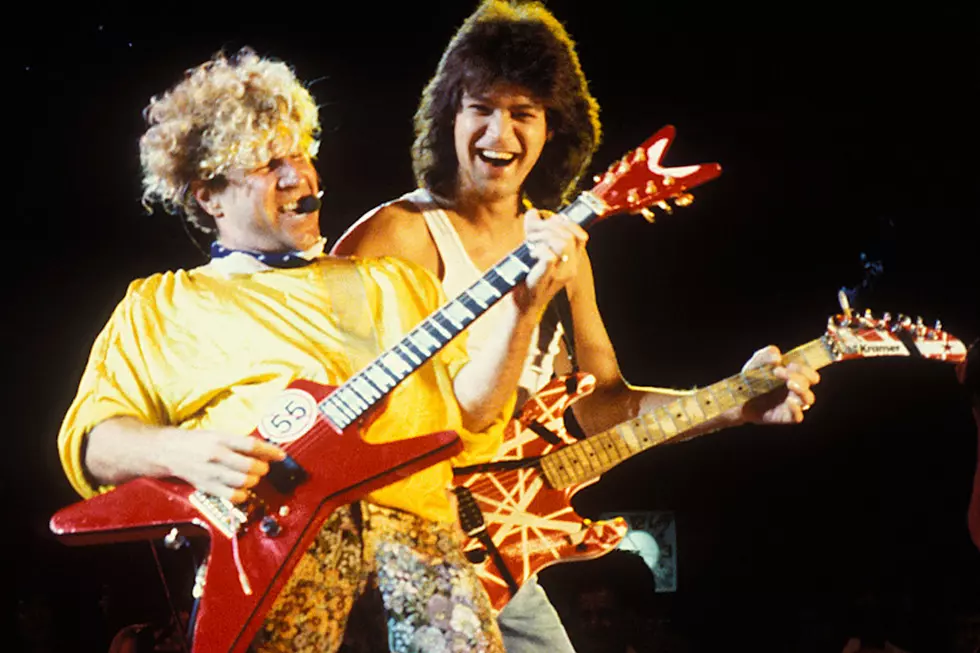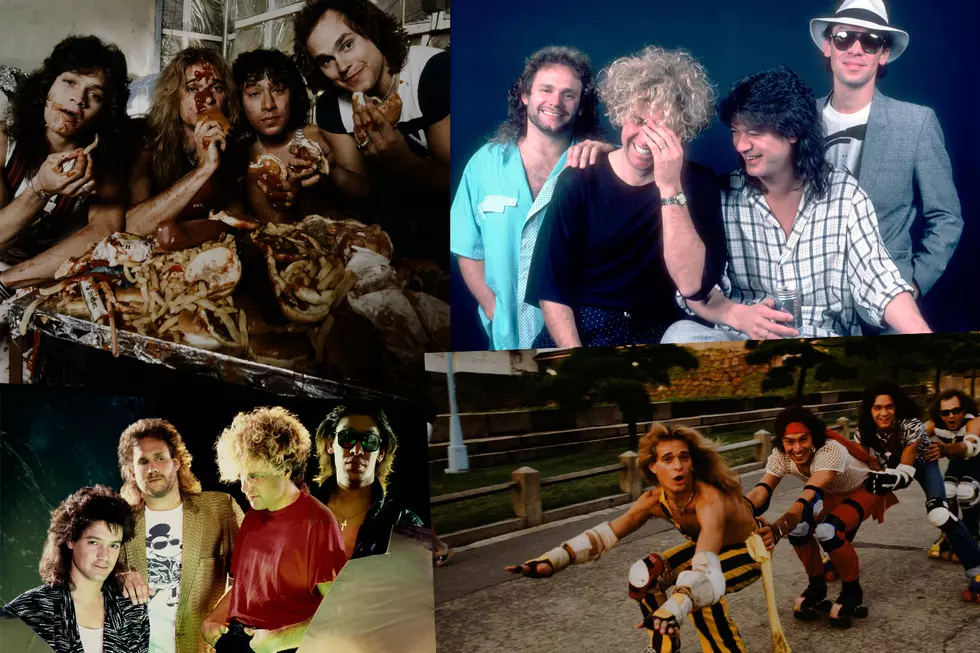
35 Years Ago: Van Halen Release ‘Hot for Teacher,’ Then Everything Goes to Hell
In the fall of 1984, Van Halen dominated rock 'n' roll.
Their latest album, 1984, had sold a jaw-dropping 4 million copies in less than a year. The album’s debut single, the keyboard-driven “Jump,” became a No. 1 hit, an achievement aided by its irresistible video, which was ubiquitous on MTV immediately after its release. The band had just completed a multi-month, sold-out tour, and, to close out the year, prepared to release the fourth single from 1984, “Hot for Teacher.”
There was only one apparent problem with this state of affairs: Guitarist Eddie Van Halen and singer David Lee Roth weren’t doing much creative work together. While Roth and Pete Angelus, the band’s behind-the-scenes creative force and video director, huddled in a video editing bay to put the finishing touches on the “Hot for Teacher” promotional clip, Van Halen was sequestered in his 5150 studio with the group’s longtime engineer, Donn Landee, working on the soundtrack to the Cameron Crowe’s teenage comedy The Wild Life. This behind-the-scenes creative divide between the singer and guitarist would only grow in the coming months.
A year prior, however, Van Halen were firing on all cylinders. Soon after its triumphant performance at the massive US Festival, the band recorded “Hot for Teacher” at 5150. Musically, the track smoked. Drummer Alex Van Halen’s jackhammer double-bass technique, paired with a classic Eddie tapping riff and a ferocious Michael Anthony bass line, birthed a ZZ Top-on-steroids-power shuffle in the spirit of Van Halen tracks like “I’m the One” and “The Full Bug.” Still, Eddie thought “Teacher” stood alone in the band’s canon, terming it “beyond any boogie I’ve ever heard.”
Roth, too, delivered an inspired performance on “Teacher.” After producer Ted Templeman asked about the singer’s vision for the track, Roth told him “in this one, we’re all pretending to be in the classroom,” according to Ian Christe's 2007 book Everybody Wants Some: The Van Halen Saga. He wasn’t joking. The band members created a rowdy classroom soundtrack inside of 5150, punctuated with clanging cans, coughs, wisecracks and muffled curses. Over the top of it all, Roth unleashed his war whoops and jungle bellows while celebrating the fact that his unbearably sexy teacher wanted to see him after school.
When the album came out, fans and critics alike focused on Eddies’s newfound infatuation with keyboards. But any uncertainty about whether Van Halen’s guitar-bass-drums instrumental formula had lost any of its vigor was quickly dispelled by one listen to “Hot for Teacher.” Sequenced as the first song on the second side of the album, it drove home the inescapable message that Van Halen could still rock as hard as ever.
The album, it turned out, had a deep roster of songs suitable as singles. “Jump,” “I’ll Wait,” and “Panama” all charted, keeping the album red hot all through the summer.
When “Hot for Teacher” got the nod as the album’s final single, Roth and Angelus pulled out all the stops in an effort to create their most elaborate and engaging video to date. Filmed in August at a Los Angeles high school, the promotional film brought Roth’s hormone-fueled lyrics to onscreen life. Featuring child lookalikes of the four members of Van Halen and the nerdy freshman Waldo, the video’s characters experience a Van-Halen-centric fantasy day at school. Diamond Dave is their school bus driver, their hot teacher is a bikini model and book learning is nonexistent, a point punctuated by Eddie frantically soloing his way across library desktops, scattering homework and textbooks.
Watch Van Halen's 'Hot for Teacher' Video
Interspersed is a choreographed dance routine by the tuxedo-garbed band, with Roth leading his bandmates through an endearingly awkward performance. The clip wraps with a cinematic “Where Are They Now?” epilogue where viewers learn that “Edward Van Halen is temporarily ‘relaxing’ in Bellevue Mental Ward and making progress” while “David Lee Roth went to Hollywood and became America’s favorite TV game show host.”
Preceding the release of the single by about a month, the “Hot for Teacher” video became an immediate smash when it premiered on MTV on Sept. 23, 1984. It went into heavy rotation for the remainder of the year, continuing to drive sales of the 1984 album forward, even after the “Hot for Teacher” single, released in late October, petered out at No. 56 on the Billboard chart.
For the rest of the year, the creative pair that had made Van Halen soar began to drift in different directions. Eddie, who’d expressed increasing interest in writing more melodic, pop-oriented material, joined Scandal and Patty Smyth onstage in three different cities in November. He also began writing in preparation for the recording sessions (scheduled to get underway in January) for the next Van Halen record, working closely with Landee, his longtime engineer and best friend.
Roth, meanwhile, laid the groundwork for his upcoming solo EP, Crazy From the Heat. In hyping his new music, Roth pointedly noted that the video medium had propelled Van Halen to new heights of popularity, and suggested that the silver screen might be the new frontier for Van Halen, since he and his bandmates seemed destined to “become major Hollywood movie moguls.”
His bandmates didn’t share that vision for the future of Van Halen. After they rejected Roth's idea for a Van Halen movie, the singer and Angelus threw their energies into creating video productions so elaborate that they would even surpass “Teacher.” In fact, Roth and Angelus offered up a subtle continuity between the last Van Halen video and Roth’s first solo one, “California Girls,” by having Waldo prominently appear in the clip’s opening Twilight Zone-inspired sequence.
The Angelus and Roth formula delivered once again. The video became one of the most memorable in MTV history, sending Roth’s Beach Boys cover rocketing into Billlboard’s Top 10. While the follow-up single, “Just a Gigolo/I Ain’t Got Nobody” didn’t chart as well as “California Girls,” it turns out that history was just repeating itself. As had happened with “Hot for Teacher,” the video’s massive MTV popularity made its Billboard chart position something of an afterthought. The clip, which featured Roth dancing and clowning around with Michael Jackson, Billy Idol and Cyndi Lauper impersonators, stretched over six-plus minutes. It ended with Roth locked in freeze-frame, accompanied with the onscreen text: "We'll be back."
That message begged the question: Who was the “we” Roth referenced? Roth and Angelus? Roth and Eddie? That question hung in the air in early 1985, especially as Van Halen remained in limbo for months. After the recording sessions for a seventh Van Halen album fell apart (Roth would later comment that the music coming out of 5150 was so morose and sub-par that he felt creatively uninspired), Roth and Angelus wrote a screenplay for a Roth movie, working around the clock to secure a deal for their project. Eddie would subsequently tell Rolling Stone how things with Van Halen came to an end: “He wasn't showing up for rehearsal. ... I just laid it on the line. I said, ‘What’s going on here? Do you want to make a record or not?’ And he said no. He wanted to make his movie.”
At this point, Van Halen were over. Roth had, according to Eddie, “left to become a movie star.” Roth vigorously disputed that accusation, but the truth was he spent almost all of 1985 working on soundstages and movie lots in pursuit on Hollywood stardom.
By summer, singer Sammy Hagar had made his way into Van Halen as Roth’s replacement. He and the other three members of the band got to work on 5150, an album that would emerge to great fanfare in early 1986, at a moment when Roth’s movie had already been shelved, never to be made.
Notably, the new Hagar-fronted version of Van Halen chose not to try to follow-up the original band’s last video. In fact, they’d shoot no videos featuring the group at all for 5150. That curious strategy, however, apparently worked just fine. 5150 would go on to sell more than 5 million copies and went to No. 1 on the chart, a Billboard high point that 1984 and Crazy From the Heat, despite their memorable videos, never achieved.
Van Halen Lineup Changes: A Complete Guide
More From 96.7 The River










